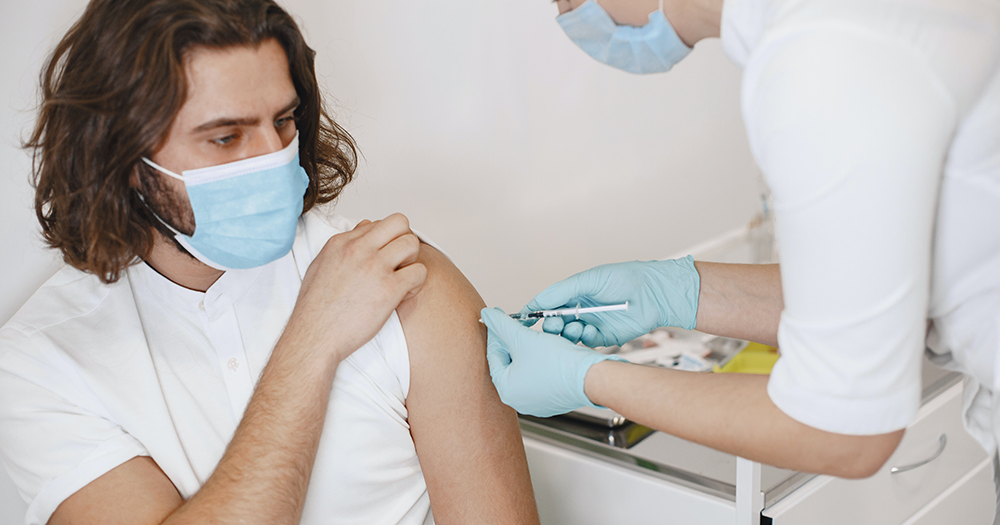On Wednesday, July 26, Minister for Health Stephen Donnelly announced plans to extend the use of the smallpox vaccine to people at high risk of contracting monkeypox in Ireland. The move follows the National Immunisation Advisory Committee (NIAC) recommending to the Interim Chief Medical Officer (CMO) that two doses of the jab should be administered 28 days apart to eligible parties, including gay, bisexual and other men who have sex with men (gbMSM).
Speaking on the news, Minister Donnelly said: “I welcome these recommendations which represent an important step in our ongoing response to the monkeypox outbreak and help protect those at high risk of exposure to monkeypox.
“Monkeypox is usually a self-limiting illness, and most people recover within a few weeks, however the rapid spread of infection necessitates further measures beyond those currently in place. The evidence suggests this approach to targeted pre-exposure prophylaxis may be highly efficient in controlling further spread of the disease,” he continued.
Although no rollout calendar was confirmed by the Minister, he said: “The Department of Health and the HSE will now work to implement these new recommendations in relation to vaccination.”
Minister for Health announces NIAC and ICMO recommendations on monkeypox vaccination https://t.co/hJHRkrcc9Y
— Department of Health (@roinnslainte) July 26, 2022
Interim CMO Professor Breda Smyth added to the statement, saying: “These recommendations reflect a strengthening of measures to control disease transmission and ensures that our response to this evolving situation is informed by the best available evidence.
“I strongly encourage those with symptoms of infection to seek medical advice and follow the public health guidance,” she concluded.
The announcement that the smallpox vaccine will be used to combat the spread of monkeypox in Ireland has been welcomed by several activist groups including HIV Ireland. Speaking to NewsTalk, MPOWER Programme Manager Adam Shanley expressed that “It is a really welcome development.”
“We definitely welcome the announcement making vaccines available to gay and bisexual men at highest risk of acquiring monkeypox.
He continued: “We are in the outbreak a couple of weeks now and we know that this is really effective tool at either minimising the disease and also bringing the outbreak to an end.”
Later today we’re holding a community discussion on #Monkeypox with @GCNmag, @Man2ManIreland & @_respectprotect.
Hear from experts leading the response and people who’ve had the virus; and we'll discuss what else we need, including access to a vaccine.https://t.co/9HmRWEYcH5 pic.twitter.com/TUVgjirFLy
— HIV Ireland (@HIVIreland) July 27, 2022
ACT UP Dublin has also responded to the news, taking to Twitter to urge the HSE to issue “swift communication” and “clear messaging” on how to access the vaccine.
WHEN, WHERE, HOW, WHO
It’s important that clear communication is given of the details https://t.co/2J7BdhyRQ8
— ACT UP Dublin (@ActUpDublin) July 26, 2022
Shanley will talk in further detail about the current situation at a virtual community discussion tonight, run by MPOWER in partnership with Man2Man and GCN. ‘Monkeypox Outbreak – A Community Discussion’ will be streaming live on Facebook and YouTube from 6PM on Wednesday, July 27, with medical professionals and people who have been infected with monkeypox sharing knowledge, information and lived experiences surrounding the virus.
© 2022 GCN (Gay Community News). All rights reserved.
Support GCN
GCN is a free, vital resource for Ireland’s LGBTQ+ community since 1988.
GCN is a trading name of National LGBT Federation CLG, a registered charity - Charity Number: 20034580.
GCN relies on the generous support of the community and allies to sustain the crucial work that we do. Producing GCN is costly, and, in an industry which has been hugely impacted by rising costs, we need your support to help sustain and grow this vital resource.
Supporting GCN for as little as €1.99 per month will help us continue our work as Ireland’s free, independent LGBTQ+ media.
